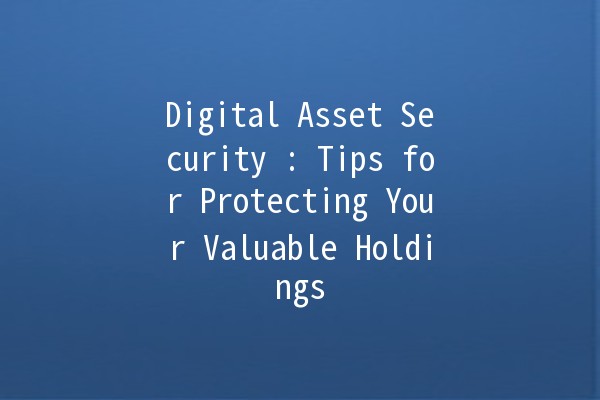
In today's digital age, the concept of security has evolved significantly, particularly regarding digital assets. As more individuals and companies invest in cryptocurrencies, NFTs, and other digital assets, the need for robust security measures has never been greater. Protecting these assets from theft, hacking, and loss is crucial for maintaining value and ensuring peace of mind. This article provides actionable tips and techniques for enhancing your digital asset security.
Understanding Digital Assets
Digital assets encompass a variety of items stored in a digital format. This includes cryptocurrencies like Bitcoin and Ethereum, tokens associated with blockchain networks, digital artworks represented as NFTs, and even digital representations of physical assets. As the value and popularity of these assets rise, so does the threat posed by cybercriminals.
The Importance of Digital Asset Security
The growing prevalence of digital assets has given rise to new security challenges. Cyberattacks are becoming increasingly sophisticated, with hackers devising new methods to exploit vulnerabilities. Therefore, individuals and organizations must prioritize securing their digital assets to minimize potential losses.

Key Strategies to Enhance Digital Asset Security
Explanation:
Your digital assets are often safeguarded by passwords. It's crucial to create strong, unique passwords for each account related to your digital assets.
Implementation Example:
Instead of using easily guessable passwords like "password123" or your birthdate, consider using a combination of uppercase letters, lowercase letters, numbers, and special characters. For instance, a password like "B1tC0in@Secure!2023" is much more secure. Utilize a password manager to help store and generate complex passwords to enhance security further.
Explanation:
Twofactor authentication adds an additional layer of security beyond just a password. Even if a hacker manages to obtain your password, they still need a second form of verification to access your account.
Implementation Example:
Many cryptocurrency exchanges and wallet providers offer 2FA options through apps like Google Authenticator or Authy. After setting it up, you'll be required to enter a timesensitive code generated by the app in addition to your password when logging in.
Explanation:
Hardware wallets are physical devices specifically designed to securely store your private keys offline, minimizing the risk of hacks.
Implementation Example:
Invest in reputable hardware wallets like Ledger Nano S or Trezor, which store your digital assets securely offline. By keeping your private keys stored on these devices and away from internetconnected platforms, you significantly reduce the risk of unauthorized access.
Explanation:
Keeping your software and applications updated is essential for preventing exploits from vulnerabilities that hackers may use to gain access to your assets.
Implementation Example:
Ensure that your operating system, wallet applications, and security software are regularly updated. Enable automatic updates whenever possible to ensure you always have the latest security patches and features.
Explanation:
Phishing scams are a common tactic used by cybercriminals to trick users into providing their information, such as wallet keys or passwords.
Implementation Example:
Always verify the authenticity of the websites and links you interact with. Look for secure connections (https://) and check the URL carefully to avoid phishing sites masquerading as legitimate services. Additionally, consider using browser extensions like HTTPS Everywhere to enhance your security while using the web.
Implementing effective measures to secure your digital assets is essential in the contemporary digital landscape. By using strong and unique passwords, enabling twofactor authentication, utilizing hardware wallets, keeping software up to date, and being cautious of phishing attempts, you can significantly enhance your digital asset security.
Common Questions About Digital Asset Security
While the underlying principles of online security apply to digital assets, the consequences of breaches can be more severe due to the irretrievable nature of digital currencies and tokens. Regular security measures applied to email or social media accounts may not suffice for protecting highvalue digital assets.
Recovery of digital assets depends on having your recovery phrase or seed phrase. Most wallets provide this during initial setup, which should be stored securely offline. If you lose your device but retain the recovery phrase, you can restore your wallet on another device.
While reputable exchanges have security measures in place, leaving significant amounts of digital assets on exchanges can be risky. Consider transferring your assets to a hardware wallet or personal wallet for better security.
Research the wallet service, reviewing user feedback, terms of service, and privacy policies. Look for reports of previous security breaches and how they were handled to gauge the service's reliability.
Some companies are beginning to offer insurance for digital assets, although coverage may vary. Research available policies carefully to ensure they meet your needs, acknowledging that coverage may not fully mitigate risks associated with loss or theft.
If you believe your account has been compromised, immediately change your passwords, enable 2FA, and withdraw your funds to a secure wallet. Notify the service provider to assist with securing your account and investigating the breach.
With the right strategies and vigilance, you can protect your digital assets against unauthorized access and ensure your investments remain secure.

